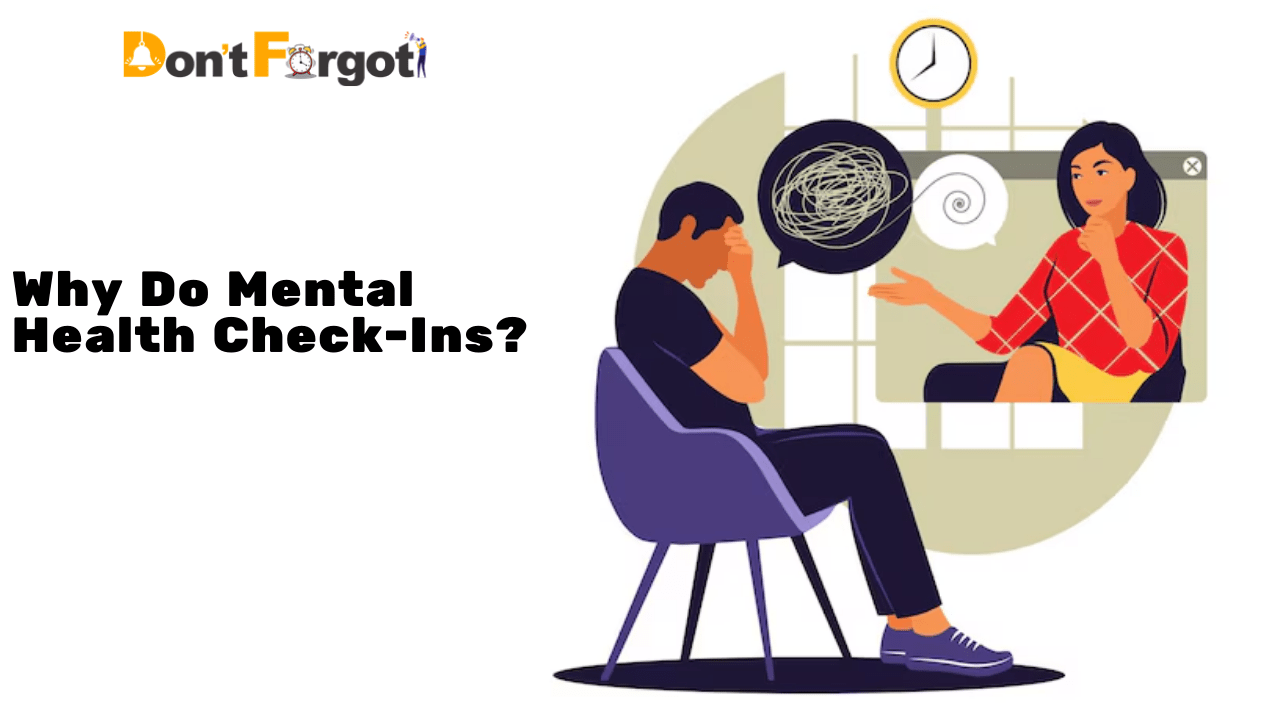Mental health check-ins are essential for maintaining emotional well-being and detecting early signs of stress, anxiety, or depression. Just as physical health requires regular monitoring, our mental health also benefits from routine check-ins. By assessing your thoughts and feelings, you gain valuable insight into your emotional state, allowing you to address potential issues before they escalate.
Mental health check-ins enhance self-awareness, strengthen emotional resilience, and improve mental fitness, encouraging a proactive approach to overall well-being.
These regular reflections can help you identify stressors, develop coping strategies, and seek support when needed, making mental health check ins a vital part of holistic self-care.
Why Do Mental Health Check-Ins?
Mental health check ins are essential for maintaining emotional and psychological well-being. These regular evaluations help individuals stay aware of their mental state, offering early intervention opportunities. By addressing concerns before they escalate, people can receive timely support, reducing the risk of severe mental health issues. Check-ins promote self-awareness, help identify stressors, and enable individuals to develop effective coping strategies.
Whether through self-assessments or professional evaluations, these check-ins act as preventive measures, ensuring emotional health is as important as physical health. This proactive approach fosters resilience and helps individuals navigate challenges with greater ease.
1. The Essence of Mental Health Check-Ins
At its core, a mental health check-in is more than just a cursory glance at one’s emotional state. Emotional well-being is a deliberate pause to assess one’s psychological well-being. It is as important as physical health checks.
These check-ins range from informal self-assessments to professional evaluations. Both types serve as critical checkpoints in maintaining mental health. Regular check-ins help us stay attuned to our emotional well-being.
2. The Imperative of Early Detection
One of the most compelling arguments for regular Self-assessment lies in their power of early detection. Much like a stealthy predator, mental health issues often creep up silently, their presence only becoming apparent when they’ve already sunk their claws deep into our psyche.
By engaging in routine check-ins, we equip ourselves with a proactive defence mechanism capable of identifying potential issues before they escalate into full-blown crises.
Consider, for instance, the subtle onset of depression. You can easily dismiss its initial symptoms, such as persistent sadness, loss of interest in once-enjoyable activities, or unexplained fatigue, as temporary mood fluctuations. However, by doing regular check-ins, you can recognize and address these early warning signs promptly, potentially averting a more severe depressive episode.
3. Nurturing Self-Awareness and Emotional Intelligence
In the cacophony of our fast-paced lives, self-awareness often becomes a casualty. Stress management is a powerful tool for reconnecting with our inner selves and fostering a deeper understanding of our emotional landscape. This heightened self-awareness, in turn, cultivates emotional intelligence, a critical skill that enhances our ability to navigate personal and professional relationships with finesse.

Regularly engaging in these introspective exercises, we learn to identify our emotional triggers, recognize patterns in our thought processes, and develop healthier coping mechanisms. This self-knowledge becomes invaluable, empowering us to make informed decisions about our mental well-being and overall life choices.
4. Breaking the Stigma and Normalizing Mental Health Discussions
Despite significant strides in recent years, mental health still suffers from a pervasive stigma in many societies. Regular Coping strategies play a crucial role in dismantling these barriers by normalizing discussions about mental health. When we treat Mental wellness with the same casualness and importance as annual physical exams, we contribute to a cultural shift that views mental health as an integral part of overall well-being.
This normalization has far-reaching implications. It encourages those struggling in silence to seek help, fosters a more supportive environment in workplaces and educational institutions, and ultimately contributes to a more compassionate society and understanding of mental health challenges.
5. Enhancing Resilience and Stress Management
Life, with its unpredictable twists and turns, often tests our resilience. Mind health check-ins serve as training grounds for building this crucial psychological muscle. We develop a toolkit of coping strategies and stress management techniques by regularly assessing our mental state and addressing potential issues.
These check-ins allow us to identify our stress triggers and develop personalized strategies to mitigate their impact. Whether through mindfulness practices, cognitive restructuring, or lifestyle modifications, the insights gained from these assessments empower us to face life’s challenges with greater equanimity and resilience.
6. Preventing Crisis and Promoting Long-term Well-being
Perhaps the most compelling argument for Psychological support is its role in crisis prevention. By addressing mental health concerns in their nascent stages, we significantly reduce the risk of reaching a crisis point. This proactive approach saves individuals from immense suffering and alleviates the burden on healthcare systems and society at large.
Moreover, regular check-ins contribute to long-term well-being by encouraging the development of healthy habits and coping mechanisms. They serve as reminders to prioritize self-care, maintain work-life balance, and cultivate supportive relationships—all crucial elements of a fulfilling and mentally healthy life.
FAQs About Why Do Mental Health Check-Ins
How often should I perform mental health check-ins?
While the frequency can vary based on individual needs, most experts recommend monthly self-assessments and annual professional check-ins. However, more frequent check-ins may be beneficial during periods of high stress or significant life changes.
Can mental health check-ins replace professional therapy?
While check-ins are valuable tools for monitoring Anxiety management, they cannot replace professional therapy. They can, however, help identify when professional help might be needed and complement ongoing therapeutic work.
What should I do if a mental health check-in reveals concerning results?
If a check-in raises red flags, it is crucial to contact a mental health professional. This could be a therapist, counsellor, or doctor who can assess and recommend the next steps.
Are there any risks associated with mental health check-ins?
Generally, mental health check-ins are safe and beneficial. However, they may sometimes bring up difficult emotions or realizations. It’s important to have support systems and be prepared to seek professional help.
Conclusion
Incorporating mental health check-ins into your routine can have profound benefits. Regularly evaluating your emotional and psychological state allows for early intervention, helping you tackle stress and anxiety before they escalate into more serious issues. Mental health check-ins empower you to develop self-awareness, healthier coping strategies, and stronger emotional resilience.
Mental health check-ins are essential for holistic well-being. Prioritize your mental health with regular check-ins and make them part of your self-care routine. Emotional well-being is just as important as physical health.

